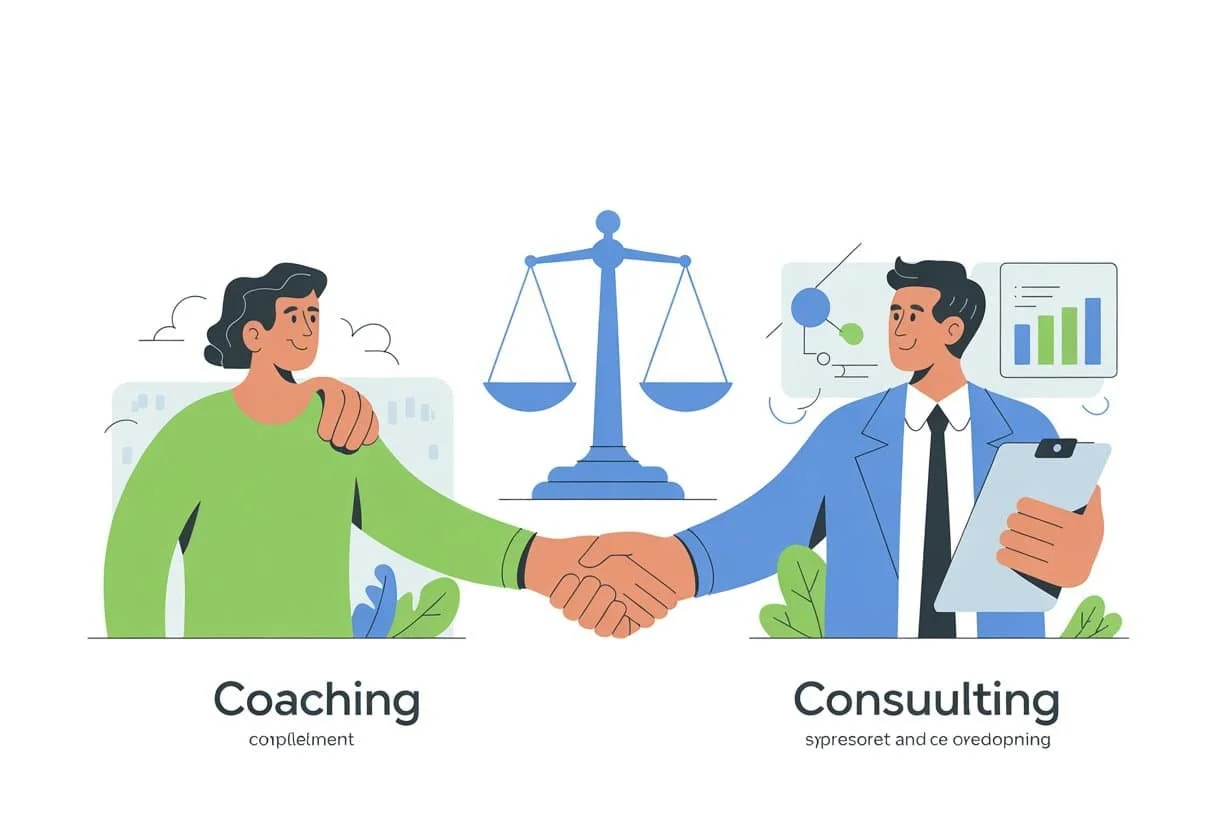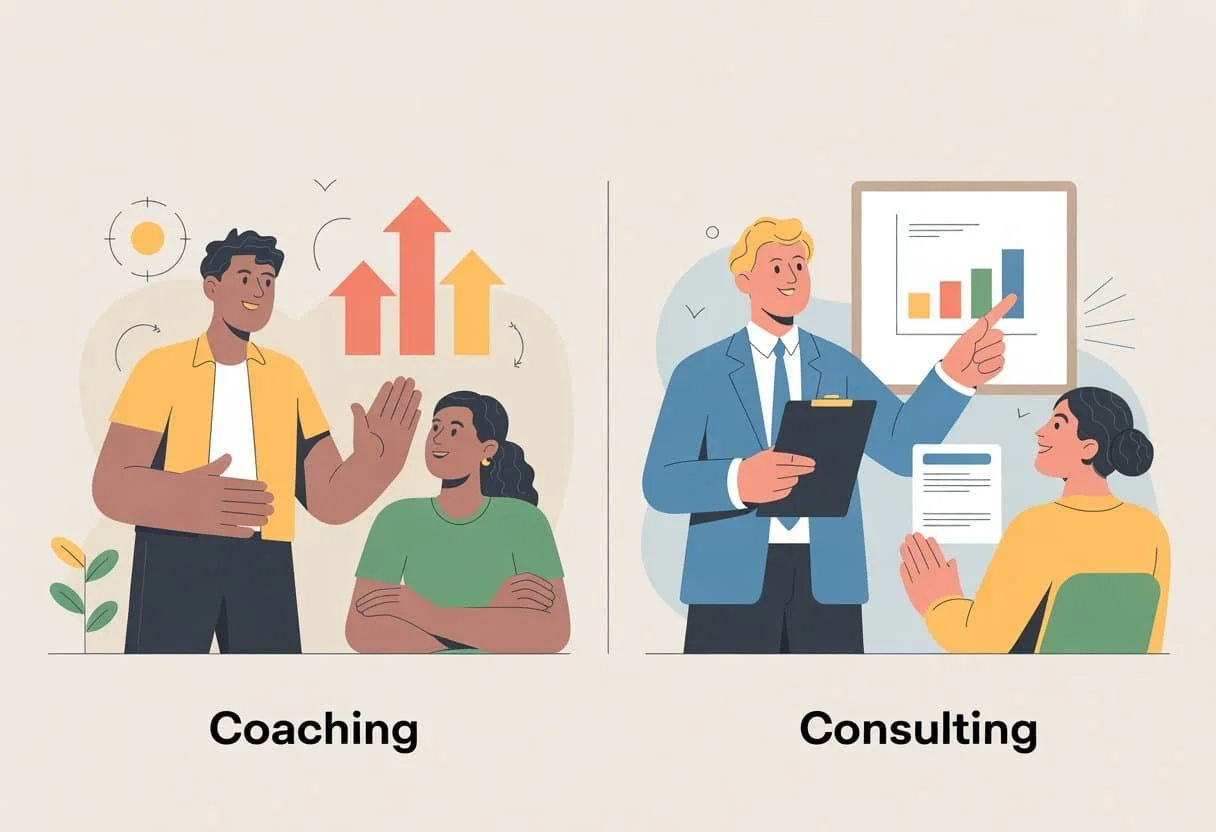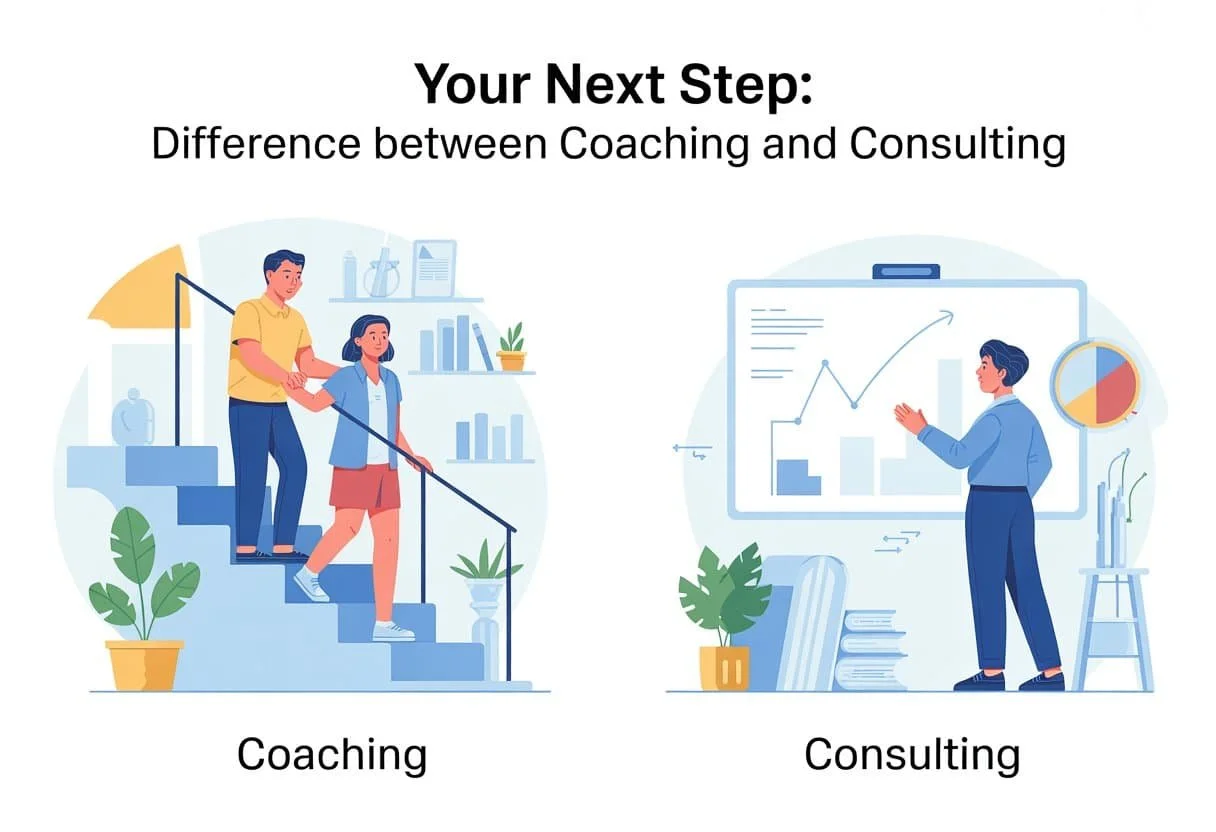Difference Between Coaching and Consulting with a Mentor
Many entrepreneurs struggle with deciding between hiring a coach or a consultant for their business needs. The key difference lies in their approach. Coaches focus on guiding you to find your own solutions through questioning and support. Consultants provide specific expertise and direct recommendations based on their knowledge.
Coaching empowers you to develop your own skills and thinking processes, while consulting delivers expert solutions to specific problems. This distinction matters because your business might need different types of help at various stages of growth. Coaches help you grow as a leader, while consultants fix particular issues.
The job market shows growing demand for both roles according to TheJobNetwork, but they serve different purposes. A coach might help you clarify your vision and overcome mental blocks. A consultant typically analyzes your business operations and recommends specific changes to improve performance.
Straight To The Point: What's The Difference?
Coaching and consulting serve different business needs, though people often confuse them. Let's clarify the key differences.
Coaching focuses on guiding clients to discover their own solutions. Coaches ask powerful questions and help entrepreneurs develop their thinking skills.
Consulting provides direct expert advice and solutions. Consultants analyze problems and tell clients exactly what to do based on their expertise.
The relationship dynamics also differ significantly. Coaches work alongside clients as thinking partners, while consultants position themselves as subject matter experts who deliver specific recommendations.
| Aspect | Coaching | Consulting |
|---|---|---|
| Focus | Personal/professional development | Specific business problems |
| Approach | Question-based, client discovers answers | Solution-based, consultant provides answers |
| Timeframe | Ongoing relationship | Often project-based |
| Expertise | Process expertise | Content expertise |
Coaches help clients build capabilities for long-term success. They rarely tell clients what to do, instead helping them develop their decision-making skills.
Consultants bring specialized knowledge to solve immediate problems. They conduct analysis, identify gaps, and provide ready-made solutions for implementation.
The choice between coaching and consulting depends on what the business needs most: guidance to develop internal capabilities or specific expert solutions to pressing problems.
When You Need A Coach
A coach becomes essential when you're seeking personal and professional development but aren't sure how to proceed. Coaches don't provide direct solutions like consultants; instead, they help you discover your own path forward.
Entrepreneurs often benefit from coaching when they feel stuck in their growth journey. A coach helps clarify career goals and provides the accountability needed to achieve them.
Many professionals seek coaches during transitions or when facing difficult decisions. The coach serves as a neutral sounding board, asking powerful questions that lead to clarity.
Executive coaches are particularly valuable for leaders facing increased responsibilities. They help develop leadership skills and improve management approaches without dictating specific business strategies.
Coaches excel at improving work/life balance issues when professionals struggle with boundaries or burnout. They focus on sustainable habits rather than quick fixes.
Those lacking motivation or feeling uncertain about their direction will find coaches adept at reconnecting them with their purpose. This process often involves exploring values and priorities.
A good career coaching relationship provides ongoing support throughout challenges. Unlike consulting projects with definite endpoints, coaching partnerships evolve as needs change.
The best coaching candidates are open to feedback and willing to create an action plan. They understand that the coach facilitates growth but doesn't do the work for them.
Professionals seeking long-term success rather than just immediate results will find coaching particularly beneficial. Coaches focus on developing capabilities that transfer across multiple situations.
When You Need A Consultant
Consultants serve as specialized problem-solvers for businesses facing specific challenges. They bring expert advice and fresh perspectives to situations requiring immediate resolution.
A consultant becomes essential when your organization lacks internal expertise in a particular area. This might include regulatory compliance, market entry strategies, or technical implementations that require specialized knowledge.
Key scenarios for hiring a consultant:
Complex business decisions requiring objective analysis
Short-term projects with defined outcomes
Technology implementations beyond your team's capabilities
Restructuring or major organizational changes
Crisis management situations
Professional services from consultants typically operate on a project basis with clear deliverables. Unlike coaches who develop your abilities, consultants provide ready-made solutions.
The timeline for engaging a consultant depends on the scope of work. Some projects last weeks while others extend for months based on complexity and organizational needs.
Consultants charge premium rates for their specialized knowledge. Their fees reflect the value they bring through established frameworks and methodologies refined across multiple clients.
Career consultants often specialize in specific industries or functions. This specialization allows them to quickly identify patterns and apply proven solutions to your business challenges.
When evaluating potential consultants, examine their track record with similar problems. Request case studies demonstrating measurable results they've achieved for organizations like yours.
Head-To-Head: Coaching Vs. Consulting Comparison
Coaching and consulting serve different business needs through distinct approaches. Let's examine their key differences:
| Aspect | Coaching | Consulting |
|---|---|---|
| Primary Focus | Developing the client's capabilities | Providing specific solutions |
| Knowledge Transfer | Draws out client's knowledge | Imparts expert knowledge |
| Timeline | Long-term relationship | Often project-based |
| Leadership Approach | Builds client's leadership abilities | Leads by example and direction |
| Decision Making | Client makes decisions | Consultant recommends decisions |
Coaches ask powerful questions that prompt clients to discover their own answers. They believe clients possess internal wisdom to solve challenges with proper guidance.
Consultants analyze problems and deliver specific strategies based on their expertise. They're hired for specialized knowledge that organizations lack internally.
Feedback styles differ significantly between these roles. Coaches provide reflective feedback aimed at growth and self-discovery. Consultants deliver direct, solutions-oriented feedback focused on implementation.
The leadership dynamic varies too. Coaches develop the client's leadership abilities through reflection and skill-building. Consultants typically lead through expertise and direction.
Strategy development follows different paths. Coaches guide clients to create their own strategies through exploration and discovery. Consultants analyze situations and recommend specific strategic approaches based on past successes.
Real Results, Real People
The proof of effective coaching and consulting lies in client success stories. Let's explore some genuine experiences from entrepreneurs who have benefited from these approaches.
Coaching Success: Emily's Story
Emily struggled with time management in her startup. Through coaching, she identified her priorities and developed a personalized system. Within three months, her productivity increased by 40% and work-life balance improved dramatically.
Consulting Impact: Riverstone Tech
When Riverstone Tech faced market challenges, they hired a consultant. The consultant provided a detailed analysis and strategic roadmap. The company implemented these recommendations and saw a 27% revenue increase within two quarters.
Different Approaches, Different Results
| Client | Service Type | Problem | Outcome |
|---|---|---|---|
| Jason's Bakery | Coaching | Leadership struggles | Developed confidence, expanded to 3 locations |
| TechFlow Inc. | Consulting | Inefficient processes | 35% reduction in operational costs |
| Green Earth Products | Combined approach | Scaling issues | Doubled revenue, retained company culture |
Entrepreneurs often report that coaching delivers longer-lasting behavioral changes. The skills they develop remain valuable throughout their careers.
Consultants tend to provide more immediate, measurable results in specific business metrics. Their expertise often translates to quick financial improvements.
The most powerful stories come from business owners who strategically use both services at different stages of growth. They gain both the tactical advantages of consulting and the developmental benefits of coaching.
Still Can't Decide? You Might Need Both
Many entrepreneurs find themselves at a crossroads when choosing between coaching and consulting. The truth? Sometimes you need both services to achieve optimal results.
Think of it as different tools for different phases of your business journey. A consultant might analyze your sales funnel, while a coach helps you implement the recommended changes with confidence.
When both services make sense:
During major business transitions
When implementing complex strategic changes
If you need both technical expertise and personal development
When facing challenges that require multiple perspectives
Some professionals offer hybrid services that blend coaching and consulting approaches. These integrated models provide technical solutions while building your capacity to execute them.
Consider this practical approach: Start with consulting to identify specific issues and create action plans. Then transition to coaching to develop the skills needed to implement those plans effectively.
The investment may seem greater initially, but the comprehensive support often accelerates results. Many business owners report faster progress when utilizing both services in tandem.
Remember that timing matters. You might need intensive consulting during strategic planning phases, then switch to periodic coaching for ongoing implementation support.
The business landscape demands both technical expertise and leadership development. The most successful entrepreneurs recognize when to leverage each type of support for maximum impact.
What You Get With Jaga
Jaga delivers a unique blend of coaching and consulting to propel entrepreneurs forward. Clients receive personalized growth strategies tailored to their specific business challenges.
The Jaga approach combines deep business expertise with accountability systems that drive real results. Adam Saieed brings over a decade of experience helping entrepreneurs break through plateaus.
Core Benefits:
Strategic roadmapping for sustainable growth
Revenue optimization frameworks
Leadership development
Systems implementation
Accountability partnerships
Entrepreneurs working with Jaga typically see 30-40% revenue increases within six months. The process begins with a comprehensive business assessment to identify hidden opportunities.
Unlike traditional consultants, Jaga stays involved throughout implementation. This hands-on approach ensures strategies translate into tangible outcomes.
Jaga's methodology emphasizes both business mechanics and mindset shifts. The combination addresses technical challenges while developing the entrepreneur's capacity to lead effectively.
Client meetings follow a structured format that balances reflection with forward action. This rhythm creates momentum while allowing space for strategic thinking.
The Jaga experience includes access to proprietary tools developed from work with hundreds of growing businesses. These resources accelerate implementation and reduce the learning curve.
Final Section – Your Next Step
Now that you understand the differences between coaching and consulting, it's time to determine which approach best fits your business needs.
Start by identifying your specific challenges. Do you need an expert to provide solutions (consultant) or someone to help you find your own answers (coach)?
Consider these factors when making your choice:
Your budget and timeline
The complexity of your problem
Your desire for personal growth
Your team's readiness for change
Many entrepreneurs find value in a combined approach. Working with professionals who can adapt their style based on your evolving needs often yields the best results.
Take action today by scheduling exploratory calls with both coaches and consultants in your industry. These conversations will help clarify which path feels right for your current situation.
Remember that neither coaching nor consulting represents a permanent commitment. Business leaders may engage a consultant for specific projects while maintaining a long-term relationship with a coach for ongoing development.
The most successful entrepreneurs remain flexible in their approach to professional support. They recognize when to seek expert advice and when to invest in developing their own capabilities.
Your next step is simply to begin. The right support system can dramatically accelerate your business growth and personal development.
Optional Enhancements
These strategic additions to your website can help visitors determine whether they need coaching or consulting services while generating valuable leads for your business.
Interactive Quiz: "Is Coaching Or Consulting Right For Me?"
An interactive quiz creates immediate value for visitors while collecting important data. The quiz should include 5-7 questions about business challenges, leadership style, and desired outcomes.
Example questions:
Do you prefer guidance or direct solutions?
Are you looking for long-term development or immediate fixes?
What's your timeline for achieving results?
The quiz should branch based on responses, creating a personalized recommendation. Upon completion, visitors receive their results via email, requiring contact information that builds your list. A well-designed quiz typically converts at 30-40% - significantly higher than standard opt-in forms.
Lead Magnet: "The 5-Minute Growth Clarity Guide"
This downloadable PDF offers a quick framework to help business owners identify their primary growth obstacles. The guide should include:
A simple self-assessment wheel for eight business areas
Three targeted questions for each area to pinpoint specific challenges
A priority matrix to rank issues by impact and urgency
The guide demonstrates expertise while providing actionable value. To maximize effectiveness, promote it in relevant blog posts and feature it prominently on the services page. Include specific examples of how different results might indicate coaching versus consulting needs.
Sticky CTA Bar: "Free Strategy Call" Persistent During Scroll
A non-intrusive but visible call-to-action bar remains in view as visitors scroll the page. This feature increases conversion rates by 4-7% compared to static buttons.
Key elements to include:
Brief, compelling copy: "Unsure which approach fits your business? Book a free 30-minute strategy call"
A countdown timer or limited availability indicator
One-click scheduling functionality
The bar should appear after 30% scroll depth to avoid immediate overwhelm. A/B test different colors, messages, and timing to optimize performance. Integrate with a calendar system allowing immediate appointment setting.
Frequently Asked Questions
These questions address the key distinctions between coaching and consulting relationships, methodologies, and outcomes that business leaders often need clarified before engaging either service.
How do the goals of coaching and consulting differ for clients?
Coaching goals focus on developing the client's internal capabilities and decision-making skills. The coach helps clients discover their own solutions through guided reflection and questioning.
Consulting goals target specific business problems with external expertise. Consultants aim to deliver concrete solutions, strategies, or implementations that address defined organizational challenges.
The distinction lies in ownership - coaching goals belong to the client, while consulting goals often involve direct problem-solving by the expert.
In what ways do the methods of coaching contrast with those of consulting?
Coaching methods center on powerful questioning, active listening, and reflection. Coaches rarely provide direct answers, instead creating space for clients to develop their own insights.
Consulting methods involve analysis, research, and direct recommendation. Consultants gather data, apply frameworks, and present specific action plans based on their expertise.
Coaches operate from a foundation of curiosity, while consultants operate from a base of established knowledge.
What are the typical outcomes expected from coaching versus consulting engagements?
Coaching outcomes include enhanced leadership capabilities, improved decision-making skills, and personal growth. Success manifests as the client's increased confidence and competence in handling challenges independently.
Consulting outcomes deliver tangible business improvements such as increased efficiency, reduced costs, or implemented systems. Success is measured through specific metrics like revenue growth or process optimization.
Both services create value, but coaching builds internal capacity while consulting provides external solutions.
Can you describe the role of a coach in contrast to that of a consultant in a business environment?
A coach serves as a thinking partner who challenges assumptions and helps leaders navigate complex decisions. They remain neutral, asking probing questions that expand awareness and uncover blind spots.
A consultant functions as a subject matter expert who identifies problems and recommends specific solutions. They actively guide implementation based on their specialized knowledge and industry experience.
The coach develops the person; the consultant develops the business.
What are the differences in qualifications and skill sets required for coaching versus consulting professionals?
Coaching professionals typically possess strong interpersonal skills, emotional intelligence, and certification from recognized coaching programs. Their expertise lies in the coaching process rather than specific industry knowledge.
Consulting professionals require deep domain expertise, analytical capabilities, and relevant industry experience. Their value stems from specialized knowledge in areas like finance, operations, or technology.
Both fields demand excellent communication skills, but consultants sell their answers while coaches sell their questions.
How does the relationship between a coach and a client compare to that of a consultant and a client?
The coach-client relationship operates as a partnership built on trust and mutual respect. Coaches maintain a non-hierarchical dynamic where the client leads the agenda and owns their development journey.
The consultant-client relationship functions more as an expert-novice dynamic. Clients defer to the consultant's expertise while consultants take responsibility for delivering specific solutions.
Coaching relationships often extend longer-term with regular sessions, while consulting engagements typically conclude once specific deliverables are complete.







